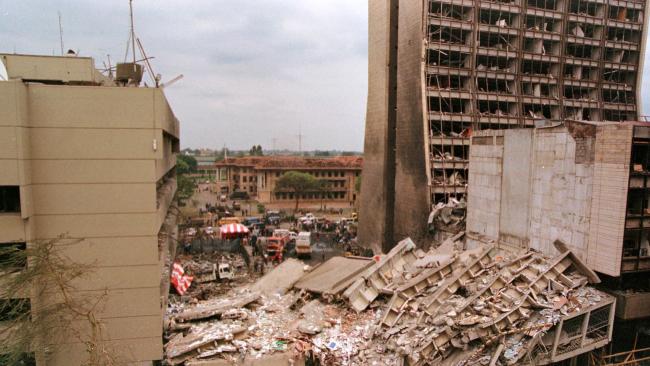On 7 August 1998, Al Qaeda detonated two suicide truck bombing attacks on the US Embassies in Nairobi, Kenya and Dar Es Salaam, Tanzania, killing 224 people and wounding over 4,500. Almost all of the victims were local citizens. In January 2008, the US extended the reach of the exclusions under the Foreign Sovereign Immunity Act (FSIA) to include private action lawsuits on behalf of non-US citizen victims if the victim was an employee of the US government at the time of the attack. In August 2008, we filed a lawsuit against the Republic of Sudan and the Islamic Republic of Iran and others for their complicity in the Al Qaeda attacks on behalf of over 600 victims under the exception to the FSIA - 28 USC §1605A. We alleged in the Complaint that Iran and Hezbollah and Sudan provided material support which included financing, training, weapons, material and safe haven, to Al Qaeda and that this support was critical to al Qaeda's execution of the 1998 embassy bombings.
Defendants failed to respond to service of the Complaints and the Clerk of Court entered defaults against Iran and Sudan.
In October 2010, a three day trial on liability was held in the US District Court for the District of Columbia for several consolidated cases involving the embassy attacks. On 30 November 2011 Hon. Judge Bates entered a final judgment on liability in favor of plaintiffs and against defendants. The Court found that “the government of Iran aided, abetted and conspired with Hezbollah, Osama Bin Laden and al Qaeda to launch large-scale bombing attacks against the United States…Iranian defendants, through Hezbollah, provided explosives training to Bin Laden and al Qaeda and rendered direct assistance to al Qaeda operatives…Sudan also provided critical financial, military, and intelligence services that facilitated and enabled al Qaeda to strengthen its terrorist network and infiltrate nearby countries. With the support of Sudan and Iran, al Qaeda killed and attempted to kill thousands of individuals on site in the 1998 U.S. embassy attacks in Nairobi, Kenya and Dar es Salaam”.
In 2013 we were granted permission by the court to file an additional Complaint (Opati) that would also be subject to the final judgment on liability. Seven Special Masters were appointed to evaluate each of the plaintiffs’ claims and prepare recommendations for the court’s approval of proposed findings and compensation.
On July 25, 2014, Hon. US District Court Judge John D. Bates issued orders in each of our four consolidated Embassy bombing cases, entering judgment in favor of the plaintiffs and awarding compensatory and punitive damages to the plaintiffs, as follows:
Opati:
Total damage award: $3,163,433,873.00
Compensatory damages with prejudgment interest: $1,581,716,936.50
Punitive damages: $1,581,716,936.50
Wamai:
Total damage award: $3,566,104,489.58
Compensatory damages with prejudgment interest: $1,783,052,244.79
Punitive damages: $1,783,052,244.79
Onsongo:
Total damage award: $199,106,578.19
Compensatory damages with prejudgment interest: $99,553,289.10
Punitive damages: $99,553,289.10
Amduso:
Total damages award: $1,755,878,431.22
Compensatory damages with prejudgment interest: $877,939,215.61
Punitive damages: $877,939,215.61
On April 11, 2015, the Republic of Sudan filed a motion to vacate the consolidated judgments. Hon. Judge John D. Bates denied the motion to vacate in its entirety.
In 2017, the U.S. Court of Appeals for the District of Columbia Circuit upheld Sudan’s liability, but ruled that the punitive damages could not be applied retroactively because the 2008 change in the law allowing for punitive damages was enacted after the bombings occurred.
On February 24, 2020, the U.S. Supreme Court heard oral arguments to reinstate the $4.3 billion in punitive damages against Sudan. The U.S. Solicitor General has filed an amicus brief and will also argue on behalf of the victims before the Court. Victims and families of victims were present for the hearing and spoke to the press immediately following it.
On May 18, 2020, the Supreme Court issued an unanimous decision, siding with victims against Sudan, ruling that “the plaintiffs proved Sudan’s role in the attacks and established their entitlement to compensatory and punitive damages.” Furthermore, this decision affirms the arguments made by the US Solicitor General before the Court that allowing Sudan to escape justice in this case would be harmful to US national security and foreign policy. The SCOTUS decision firmly establishes the rights of US victims of terror (both US citizens and foreign nationals working in service to the US) to hold state sponsors of terrorism accountable in US Court for their actions.




